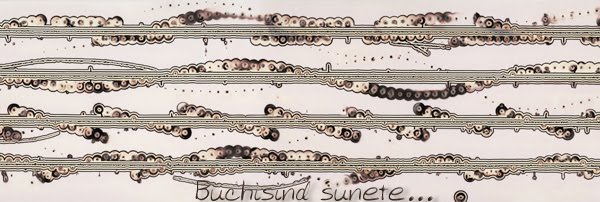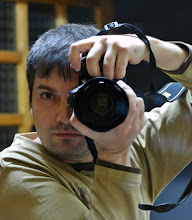Dar înainte de interviu, o scurtă privire în culisele celui mai recent proiect în care e implicat contratenorul, "Niobe - Regina Tebei".
An Interview with French Countertenor Philippe Jaroussky
In a relatively short amount of time, Philippe Jaroussky, 33, has built an international reputation as a leading countertenor. Jaroussky came to prominence in 2004, when his first solo recording for Virgin Classics caught fire. Since then, his light, soprano-like sound, facility with coloratura, boyish looks, and rare dynamic flare have made him equally popular on stage and YouTube.
I caught up with Jaroussky by phone, a few months before he was scheduled to journey to the United States to co-star in the Boston Early Music Festival’s production of Steffani’s mostly unknown opera, Niobe, Queen of Thebes. Our discussion began with the opera project.
(sursa)
Jason Victor Serinus: Please tell me about Niobe, Queen of Thebes.
Philippe Jaroussky: It’s a very, very exciting project. In fact, I didn’t know the opera at all. Paul O’Dette [of the Boston Early Music Festival] came to Europe to hear me in an opera production with William Christie of Il Sant’Alessio by Landi. O’Dette proposed I sing Niobe, and showed me the score.
I reacted almost immediately. ‘Oh my god, this is beautiful music.’ I was very surprised by the music, and I accepted absolutely in five minutes.
Of course I knew of the composer, Agostino Steffani, because he’s quite famous for his chamber music, and he had a huge influence on Handel. But I didn’t know his opera music. It’s a very special style: very virtuosic and very touching. It’s quite crazy music.
Of course, my part is very difficult. It was written for castrato voice. What I like about my character, Anfione, is that he’s a King who wants to give up his power just compose music. It’s a little bit like Orfeo. In the middle of the opera, his singing is building new walls to defend the city. It’s quite a magical power. His is a very sweet character, and the music for Anfione is particularly beautiful.
JVS: Let me see if I understand you through the long distance and language barrier. You said that in the middle of the opera, he composes music to defend the city?
PJ: Yes. In fact, at the end of the first act, Anfione’s city is attacked by other people. He starts to sing, and his singing starts to build walls all around to defend the city. This is why I compare this part to Orfeo, who convinces the inferno [the underworld] to bring his wife back to life.
Showing this magical power in the production is very challenging. I’m quite excited by it. Also, my character is very fake in a way. He wants to retire from the world just to compose music.
At the end of the opera, he learns that all of his children will be killed by God. He cannot support that, and he kills himself. It’s very touching.
The music is quite complicated. It will take me a full month to learn it. It’s a huge work, with a lot of very challenging music that has me singing in my entire range.
JVS: Are you an alto or mezzo-soprano countertenor, or are you a soprano?
PJ: Oh my god. I have to say that what’s difficult for my voice is that my color is more suited to soprano. I have quite a light voice. But the range is more of a mezzo. That’s quite difficult, because sometimes people think I can sing very high, and propose I sing things that are too high for me.
But we decided to put this part in quite a low pitch that is perfect for me. It’s not too high or too low. It’s really beautiful. And with the color of my voice, I can probably illustrate the weakness of the character as well. I think there is a good bridge between the color of my voice and the character of Anfione.
Of course, on a lot of my CDs and in concert I like to perform a lot of unknown composers. It is really unfair that we don’t know a lot of Steffani. I think he’s a beautiful bridge between Monteverdi and Handel. He was a very original composer who helped to advance the style between these two periods. Sometimes his music sounds like Cavalli, sometimes like the young Handel. It’s very inspiring music.
I was very surprised, because I didn’t know much of his music before this proposal. A year ago, Covent Garden also produced the opera. The Polish sopranist Jacek Laszczkowski sang my role, and French soprano Veronique Gens sang Niobe.
Of course, we plan to do this in Boston first. I haven’t sung the part yet, but I think it will be one of the most beautiful operatic parts in my life. It will probably become one of my favorite parts to sing onstage, along with L’Incoronazione di Poppea by Monteverdi and some Handel parts.
JVS: Was the opera performed frequently in Steffani’s time? Was it famous?
PJ: I must confess that I do not know for sure. The only thing I know is that it’s really clear from the score that the castrato who created my part was probably a fantastic virtuosic singer with a beautiful voice. The coloratura is not simple at all to sing. We can really see that Steffani composed this part specifically for a very good castrato.
When we think of castrati, we tend to think that they were all very good. But that was not the case.
JVS: It’s terrible to think about the fact that a child is castrated, only to turn out unable to sing well.
PJ: It’s a part of the fascination the audience has with the part. You have to do this abomination to castrate young boys to get this sublime voice. We know that only approximately 1% of the castrated boys sang onstage in opera. It was a terrible thing, and we fortunately we don’t do it anymore.
When I face a score like Niobe, I must be very modest and humble. The castrati probably sounded very different. We countertenors are trained to do the best musically, but castrato voices were probably far more brilliant. We have to keep this in mind, and of course do the best we can.
I also think that, for staging purposes, it’s very interesting to have a man sing a male part rather than cast a woman.
(sursa)
JVS: As a countertenor, do you sing in falsetto, or are you simply extending your full voice upwards.
PJ: Falsetto for me is a terrible word. It’s like ‘false voice.’ I don’t like that expression. It sounds like something artificial.
For me, I’m singing head voice, like a soprano or mezzo-soprano. You don’t say a soprano is singing in falsetto. For me, it’s the same mechanism as a woman. But I don’t think I use the falsetto voice.
For me, all these things about mechanism are not the most important thing for me. I try to keep the natural sound of my voice, and to sing with as much freedom as I can. But I don’t ask myself about the different mechanisms you can use. I’m trained really to keep the truth of what I want to do.
I know for a lot of people, countertenor singing is a mystery. But I think there is no mystery inside. Before the appearance of castratos there were countertenors. And if you listen to a female artist speak, she doesn’t speak like she sings. For me this is absolutely the same thing.
Maybe I think that because I always had a teacher who was a woman. I always worked, not to imitate her, but she was always showing me examples with a soprano or mezzo-soprano voice. She always tried to work my voice in that direction while of course keeping the specialty of my color.
I don’t know. There is a huge interest in countertenors now. I think in part it’s because we dream of the lost castrato voices. But we have to keep in mind that the technique was quite different because the voices were quite different. The castrato had the same vocal chord size as a boy’s. It was different.
JVS: When your voice first changed, were you singing tenor? When did you first sing countertenor?
PJ: I never sang in a boy choir. I was a violinist, and I started to sing at 18, which is quite young. I had this very small soprano voice, like a boy. When I started with my teacher, who is still my teacher 14 years later, she thought I was a good musician who perhaps had the capacity to become a countertenor. I told her, ‘Trust me. I’m sure I will be a countertenor in the future.’
It’s very curious that I said that at the age of 18. But I could project how my voice would sound after I worked on it patiently. Even she was surprised two years after to realize my voice had gotten better and better and had the capacity to sing in concert.
In the beginning, the voice was very light, small, and high. I remember that four or five years ago, I was convinced that my voice would get lower and lower, like a contralto. So I started to sing low parts. Now I realize that my voice didn’t change so much. I’ve kept the high notes I had when I was young, but the voice has changed.
This is why I accepted to sing Niobe, which is a high part.
JVS: Do you know what you’ll sing when you come to Berkeley next spring?
PJ: I’ll be with Apollo’s Fire. It will be a classical program, a mix of Handel and Vivaldi operatic arias. Some of them I’ve recorded, such as Giustino’s aria from the opera by Vivaldi, and “Mi lusingharre” from Handel’s Alcina. I wanted to have quite an easy listening debut for my tour debut in the USA.
I think it’s a good mix: I like to sing both famous arias and others that aren’t well known. What I will do in the USA is sing Niobe in Massachusetts and famous arias on tour.
JVS: Have you sung at Carnegie Hall?
PJ: Yes. It was quite amazing, because I didn’t sing baroque repertoire. I sang French songs of Debussy and Fauré. I recorded some of this on my recording, Opium. The second time, I joined an ensemble to sing Monteverdi, Cavalli, and other composers. Unfortunately, I don’t have another date there at the moment.
As a French guy, I love to sing in my own language, and there isn’t that much in the baroque repertoire in French for me. When I was a pianist, I loved to play Ravel, Debussy, Fauré. I love to sing this repertory. I love the intimacy of singing it just with the piano. I love this very much.
JVS: Do you still practice violin and piano?
PJ: The piano not so much. The violin I stopped to play for many years, but I just bought a violin a year ago to play at home. Once a week I play for myself. It’s difficult for me to learn that I learned music from the violin.
Sometimes people say to me that I’m singing like a violin. It’s a funny thing, but you cannot forget if you learn the music with an instrument, you definitely stay with this violin soul. You can’t cut the connection. The violin educated me.
I sometimes have my own group. Sometimes when I’m conducting artistically, I realize that I was speaking much more through the violin. It’s a part of my history. A lot of my idea about articulation and phrasing come from the violin, because it’s natural for me.
JVS: On the internet, there’s a lot of speculation about your sexual orientation.
PJ: I don’t like to discuss my personal life. I feel in classical music, you don’t have to speak about that. I have many reasons. And there is no correlation between having a countertenor voice and being gay. I think it’s not very interesting.
JVS: You’re from a younger generation. It’s a whole different.
PJ: What is interesting is it may be easier for a countertenor to express feminine emotions. In the past, Alfred Deller was a little bit obsessed to show his children, because he was afraid that people would think he was gay.
JVS: Will we ever hear you sing while you accompany yourself on the piano?
PJ: No, I don’t think so. Of course I do it sometimes at home. Maybe once for a joke.
JVS: You’re so theatrical. I had this image of you sitting at the piano, wearing a hat, singing big band tunes or jazz. It might be fabulous.
PJ: Maybe, but I don’t think it’s my cup of tea at the moment. As an artist, we have to know what you can do well and what you can’t do well. I’ve dedicated myself mostly to baroque arias. I’m really singing what I want. I don’t want to do too many crossover things. I’m a classical artist, and I want to defend all this beautiful music.
Sometimes, of course, I can do things like this, but it’s probably not my cup of tea.
JVS: Do you do a lot of outreach to children?
PJ: Not so much. Even in France, we don’t have much music in the schools. But for me, I started music because I had a fantastic teacher in general school in France. I was 11. The teacher told my parents that I should enter a music school or conservatory. They had never thought this for me before, but it changed my life. It was fantastic.
I don’t know why, but a lot of people are afraid of classical music. They’re afraid that they won’t understand everything. I have a lot of friends who aren’t musicians. When they came to my concerts, they were surprised to enjoy the music, because they didn’t know it at all. They were surprised to be touched by this music. They never expected to be touched by classical music. That’s why as an artist you have to communicate and to sometimes be in front of different audiences than you’re used to.












